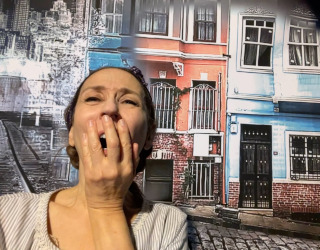
|
Beate Hein Bennett The Human Cleaning Device
“Noises in my Head,” a new play by Turkish playwright Beliz Gücbilmez, translated by Manfred Bormann, Defne Halman and Fahri Öz compacts the perennial major human catastrophes of war, displacement, poverty, and violence into a one-act one-woman play. The Woman is a cleaning woman who has worked in rich people’s homes all her adult life. She belongs to the community of largely anonymous service workers who are at the beck and call of those who feel they own their complete attentive devotion for which they pay subsistence wages. She talks not only about cleaning the private filth in these homes and suffering from the random abuse of her employers, but in the course of her non-stop narration she also shares her perspective from the underbelly of society on all the larger events that she has lived through. She is proud of her expertise and success as a cleaning woman—the occasion of her speech is the award ceremony as she is presented with the “Golden Toilet Brush Award.” She tells us that she has tried to use her meager wages to raise her daughter for a better career. Alas, the daughter has only managed to become a “snitch” for the government which could prove dangerous for the mother who is privy to her rich clients’ questionable activities (or at least the profits thereof). The Woman’s monologue careens between her private sorrows and triumphs as “the human cleaning device” (her own moniker) and her observations and experiences of the larger social and political upheavals in an autocratically governed country. Manfred Bormann has directed this production taking full advantage of TNC’s Cabaret, a basement black box theatre where the space itself becomes a metaphor for the play, an imaginative “lower depth” where the above world can be exposed through the Woman’s words. A painted backdrop by Julie Mardin of an urban street somewhere in the Levant with colorful houses on one side blends into a grey section of a railroad track with a lone woman on the side and a background which features grey outlines of modern high-rise buildings. In front of this backdrop is a low assemblage of various-sized matte black boxes encasing black painted kitchen objects—a sculpture reminiscent of Louise Nevelson. Joe Mardin’s sound design suggests at times an ominous atmosphere while periodically a strain of music arouses the Woman to joyful dancing. A chair stage center and a toilet brush off to stage left complete the set. The artful lighting design by Omar Jaslin underscores the quixotic mood changes behind the words of the Woman. Defne Halman, an actress equally at home on the stages and in films
and TV in Turkey as well as in theaters in the US, is a powerhouse
of passion and energy. She plays the Cleaning Woman with a rich
reservoir of emotion, humor, and physical panache. As a kind of
prelude to the play and to establish her character, she makes her
first wordless entrance with a bucket and a mop and vigorously washes
the entire stage floor, even under the feet of a front row audience
member who obligingly raised his feet; while she mops, she mumbles
something or hums a tune, and having finished her task, she disappears
backstage. (At the performance I attended some audience members
began to wonder aloud about her lengthy disappearance while loudly
arguing latecomers straggled in and finally settled, as the usher
came in front and reminded the audience of their exit possibilities
and to turn off any devices.) Ms. Halman takes full command of the
stage and her performance is a tour de force; yet her humanity shines
through the grimmest parts of this narrative about the relentless
human cruelty. It is an important document of women’s struggles
to emerge from the dark corners of society with dignity and infuse
hope for survival in the face of existential odds. TNC offers the
rare chance to hear the voice of a Turkish woman playwright in a
masterful performance of a Turkish/American actress. The director
Manfred Bormann has to be congratulated for bringing these voices
to a NYC stage but then he has a track record for bringing the rarely
heard (or seen) writers, such as George Tabori, Peter Weiss, Franz
Kafka and others to NYC stages. |
| recordings | coupons | publications | classified |

